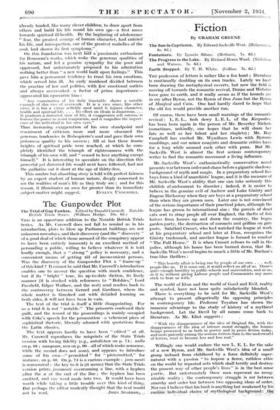The Gunpowder Plot
The Trial of Guy Fawkes. Edited by Donald Carswell. Notable British Trials Series. (William Hodge. 10s. 6d.) Tuis is an opportune addition to the Notable British Trials Series. As Mr. Carswell does not fail to remind us in his introduction, plots to blow up Parliament buildings are not unknown nowadays, and their discovery (and the " discovery " of a good deal-of which those acetsed•of the conspiracy appear to have been entirely innocent) is an excellent method of persuading a public, willing to believe whatever it is told loudly enough, that a " strong ". policy is necessary, and a convenient means of getting rid of inconvenient persons. Was the discovery of the Gunpowder Plot a " frame-up " of this kind ? It cannot be said that Mr. Carswell's introduction enables one to answer the question with much confidence, but if its " bright " tone, its up-to-date diction, its lively manner (it is stocked with references to " Bolshies," Lord Passfield, Edgar Wallace, and the rest) send readers back to the controversy between Gerard and Gardiner, where the whole matter is threshed out with detailed learning on both sides, it will not have been in vain.
The text of the trial is itself alittle disappointing. For as a trial it is not " notable." The prisoners confessed their guilt, and the record of the proceedings is mainly occupied with Coke's speech for the prosecution—a vehement piece of sophistical rhetoric, liberally adonied with quotations from the Latin classics.
The text appears hardly to have been " edited " at all. Mr. Carswell reproduces the misprints of the State Trials version with loving fidelity (e.g., ardedielam on p. 74; gnat on p. 88 ; nunquam, sera on p. 90—all of which make nonsense, while the second does not scan), and appears to introduce some of his own—" permitted " for " pietermitted," :for instance, on p. 68. On p. 74 is a Curious example : jura Inenti is nonsensical : the key to it is (it seems) that the State Trials version prints juramenti overrunning a line, with a hyphen after the a at the end of the line ; the hyphen has been omitted, and one word made into two. It would have been worth while taking a little trouble over this kind of thing. But perhaps the editor Modestly tfionght that the text would
not be read.
. • ..,Ioing_.SPABW6'.4














































 Previous page
Previous page